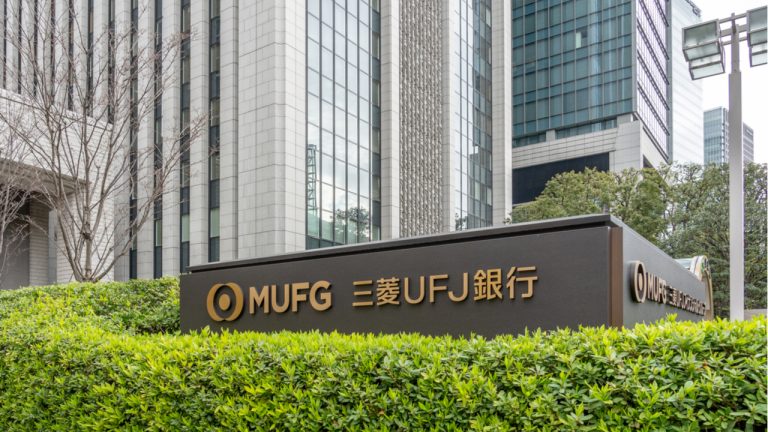
US Treasury Secretary Janet Yellen is responding to accusations that the US government and more than a dozen financial institutions have teamed up to spy on Americans’ private bank transactions. The House Judiciary Committee recently published a memo accusing the Treasury Department’s Financial Crimes Enforcement Network (FinCEN) of urging banks to surveil their customers’ transactions […]
The post US Treasury Accused of Spying on Americans’ Bank Transactions in Secret Surveillance Program As Secretary Yellen Confirms ‘Communications Took Place’ appeared first on The Daily Hodl.

Progmat Coin hopes to issue yen- and dollar-pegged “trust-type” stablecoins next summer to accommodate around-the-clock settlement.
The Progmat Coin ecosystem is taking shape in Japan. With a market maker, wallet provider and cryptocurrency exchanges on board, Progmat and Mitsubishi UFJ Financial Group (MUFG) hope to launch two stablecoins in the summer of 2024.
Stablecoin platform Progmat Coin, MUFG and wallet provider Ginco have begun a study with the goal of issuing a yen-denominated XJPY stablecoin and dollar-denominated XUSD stablecoin, Progmat said in a statement. This is in addition to the platform's function enabling stablecoin issuance.
#japan #stablecoin #crypto #payments@ginco_inc, Mitsubishi UFJ Trust and Banking, and #Progmat are starting a joint study to introduce an “infrastructure stablecoin” with the aim of improving the settlement efficiencies among the players in the crypto asset market by leveraging… pic.twitter.com/Ei3I7t2bVb
— Norbert Gehrke (@norbertgehrke) November 7, 2023
Liquidity provider Cumberland and crypto exchanges Bitbank and Mercoin also figure into the Progmat plans, and other crypto asset-related businesses are invited to join. Binance Japan announced in September that it was conducting a joint study with MUFG on the issuance of stablecoins pegged to various currencies.
Related: Japan to allow startups to raise funds by issuing crypto instead of stocks: Report
The XJPY and XUSD stablecoins will beintended to improve the efficiency of settlements between crypto asset exchanges, with XUSD for use in cross-border settlements. Japanese crypto exchanges use banks for settlement, according to the Tokyo Fin Tech blog, causing delays that the Progmat system will eliminate.
MUFG introduced the Progmat platform in February 2022 in a consortium with other large Japanese banks. It is regulated under the revised Payment Services Act that came into effect in June 2023. The revised act provides for three types of stablecoin. Progmat would support the “trust” type coin, issued by trust banks.

MUFG said in June that Progmat would be used for banks to issue stablecoins on Ethereum, Polygon, Avalanche and Cosmos. Only banks are allowed to issue stablecoins under Japanese law, and stablecoins on Progmat will be required to undergo licensing ahead of launch.
Progmat Coin is not working in a vacuum. Blockchain startup Soramitsu is exploring a new stablecoin exchange for cross-border payments to Asian countries using Camboodia’s central bank digital currency as well as stablecoin. Tokyo-based startup G.U. Technologies is also reportedly creating a stablecoin platform.
Magazine: Why Animism Gives Japanese Characters a NiFTy Head Start on the Blockchain

MUFG hasn’t revealed what firms will be the first to utilize its platform, however a handful of banks have reportedly already opted for a separate stablecoin solution.
Megabank Mitsubishi UFJ Financial Group (MUFG) has announced that its stablecoin issuance platform “Progmat Coin” will soon be used by Japanese banks to launch Yen-pegged stablecoins on several public blockchains.
Japanese banks have recently outlined intentions to either look into or launch stablecoins following new regulations that came into effect this month.
In mid-2022, the Japanese government passed a bill that prohibited the issuance of stablecoins by non-banking institutions. The bill officially came into effect on June 1, 2023.
In a June 2 announcement, MUFG outlined the Progmat Coin will be used to facilitate the issuance of bank-backed stablecoins on Ethereum, Polygon, Avalanche and Cosmos, with more networks to be added in the future.
MUFG also revealed that its blockchain tech and security partners TOKI and Datachain are building a bridge to enable cross-chain transactions, lending and swaps between the list of supported blockchains.
The bank expects the cross-chain infrastructure to be launched in the second quarter of 2022.

MUFG initially announced Progmat Coin back in February 2022, with the goal to provide an interoperable and “universal digital asset payment method” for stablecoins, other crypto assets, and even a Japan-based central digital bank currency (CBDC).
Related: OpenAI gets warning from Japanese regulators on data collecting
MUFG has not revealed which banks will be the first to utilize Program Coin, however, it did confirm to Cointelegraph at the time of the Progmat Coin announcement last year that it is working on launching its own Yen-pegged stablecoin.
According to a June 1 report from Nikkei Asia, Shikoku Bank, Tokyo Kiraboshi and Minna Bank all plan to issue stablecoins, however, it appears they won’t be using Program Coin to do so.
The publication states that these banks will use a separate stablecoin platform developed by Tokyo-based startup G.U. Technologies.
Magazine: Asia Express: Yuan stablecoin team arrested, WeChat’s new Bitcoin prices, HK crypto rules
 Tokio Marine, the biggest property/casualty insurance group in Japan, is taking its services and operations into the metaverse. The group, which has more than 39,000 employees all over the world, will allow its users to review and purchase insurance products on a metaverse platform, using real employees as clerks in the virtual world. Tokio Marine […]
Tokio Marine, the biggest property/casualty insurance group in Japan, is taking its services and operations into the metaverse. The group, which has more than 39,000 employees all over the world, will allow its users to review and purchase insurance products on a metaverse platform, using real employees as clerks in the virtual world. Tokio Marine […] MUFG, the biggest bank in Japan, is projecting to offer financial services through the metaverse in 2023. The financial giant has partnered with ANA Holdings, a holdings consortium focused on air transportation companies, to be part of ANA’s Granwhale metaverse, and explore the possibility of selling financial products on this platform next year. MUFG Prepares […]
MUFG, the biggest bank in Japan, is projecting to offer financial services through the metaverse in 2023. The financial giant has partnered with ANA Holdings, a holdings consortium focused on air transportation companies, to be part of ANA’s Granwhale metaverse, and explore the possibility of selling financial products on this platform next year. MUFG Prepares […]
Established in 2019, MUFG’s blockchain payments project GO-Net Japan is shutting down due to low expected profitability.
Japan’s biggest financial conglomerate, Mitsubishi UFJ Financial Group (MUFG), will abandon its three-year-old blockchain payment project to focus on other digital and fintech initiatives.
MUFG officially announced Tuesday the suspension of Global Open Network (GO-Net) Japan, a blockchain-based project aiming at high scalability and multi-connectivity data processing “in response to the rise of the internet of things.”
The project was officially introduced back in February 2019, with MUFG joining forces with the United States content delivery network Akamai, planning to create a payment service featuring multiple functions like communication and “management of value through blockchain.” The initiative was first announced in May 2018.
According to the latest announcement, MUFG will suspend the GO-Net Japan project due to “slow growth of payment transaction numbers caused by the impact of the COVID-19” and other factors that made it hard to develop on the scale originally expected.
“As a result, the business is not expected to be able to achieve profitability in a reasonable timeframe, and it was concluded that it would be desirable to suspend its operations,” the MUFG said. The company does not expect that the closure will have any material effect on MUFG’s financial results for the current fiscal year, the announcement notes.
In the meantime, MUFG will continue to accelerate digital transformation as its core strategy in order to become a “leading business partner that pioneers the future with financial and digital capabilities.” The company also said that it continues discussing further opportunities of collaboration with Akamai to utilize the “latest technologies based on experience from the GO-NET project.”
Related: Mark Zuckerberg’s stablecoin project, Diem, officially shuts down
As previously reported by Cointelegraph, MUFG has also been working for years on a platform for managing security tokens, developed by MUFG’s ST Research Consortium. Established in 2019, the project rebranded to the Progmat Coin project in February 2022, aiming to provide a platform for the issuance and management of stablecoins.

After many years of digital currency development, Japan’s largest bank MUFG has officially introduced its own stablecoin project.
Mitsubishi UFJ Financial Group, Japan’s largest financial group, is working hard to take the lead in stablecoin development, launching a proprietary stablecoin project.
On Wednesday, MUFG introduced its stablecoin platform called “Progmat Coin,” a blockchain-based system for issuing and managing stablecoins pegged on a 1:1 ratio to the Japanese yen.
The platform aims to enable a “universal digital asset payment method,” providing cross-chain interoperability with a wide range of other digital assets other than those issued on Progmat, as well as Japan’s central bank digital currency, the digital yen.
According to the announcement, the Progmat Coin project is based on contributions and work by MUFG’s “ST Research Consortium,” established back in 2019 with a mission to develop standards around security tokens. The consortium is now being rebranded to the “Digital Asset Co-creation Consortium,” aiming to expand the scope of work beyond security tokens to other sectors like stablecoins, nonfungible tokens (NFTs), crypto assets and others.
As part of the project, the Japanese financial giant is also planning to introduce a stablecoin based on the Japanese yen, a spokesperson for MUFG confirmed to Cointelegraph.
“It is true that we are aiming to issue a Japanese yen-based stablecoin. We have the plan to issue our stablecoin during 2023,” the representative stated. As previously reported, MUFG was previously working on similar digital currency developments since at least 2015.
The spokesperson stressed that the latest stablecoin project is “completely different” from Japan’s major digital currency project known as “DCJPY.” Announced in November 2021, the initiative united about 70 Japanese companies, including MUFG, Mizuho and Sumitomo, to launch a yen-based digital currency in 2022.
Related: Japan-based messaging app will offer trial run of native token starting in March
The news comes amid Japanese financial firms growing increasingly interested in issuing and managing digital currencies and stablecoins. Local news agency Nikkei Asia reported last week that Japanese trading house Mitsui was planning to issue a cryptocurrency pegged to gold.
As previously reported, the Japanese Financial Services Agency was planning to propose legislation in 2022 to restrict stablecoin issuance to only bank and wire transfer companies.

If passed, the rules reform could make it easier for domestic exchanges to list more crypto without needing to go through a long screening process.
The Japanese government is considering a proposal to make it easier for registered crypto exchanges to list digital assets in the local retail trading market.
Sources quoted in Bloomerg said that if the new rules are passed, exchanges that have registered with the Financial Services Agency (FSA) would be able to list certain assets without performing a lengthy screening process.
Digital assets that have been listed for more than six months on at least three domestic exchanges would be exempted from additional screening. For example, exchanges would find it easier to list Bitcoin (BTC) and Ether (ETH) if the proposal passes.
There has not yet been a final decision on the rule change.
Current listing rules require prospective coins to undergo an extensive screening process which can take over six months to complete. Members of the Japan Virtual and Crypto Exchange Association (JVCEA) have complained that the stringent screening process has precluded the $1 trillion Japanese crypto industry from growing in a significant way.
Members of the JVCEA have reportedly argued that changing the existing rules to allow for expedient processing could increase Japanese involvement in the global crypto markets.
As of now, Coincheck and GMO Coin have 17 listed coins each, making them the biggest exchanges in Japan by number of listings. Japanese exchanges have lagged far behind global exchanges which have coins listed by the hundreds in the case of top exchanges such as Coinbase and Binance.
The proposed rules come at an interesting time as both Coinbase and FTX have entered the competitive Japanese crypto market with subsidiaries registering crypto exchanges.
Related: Major crypto exchanges eye Asian market amid growing regulatory clarity
On Feb. 2, Sam Bankman-Fried’s FTX exchange acquired Liquid Group, the operator of the Japanese registered Quoine crypto exchange. Quoine will eventually eventually “integrate FTX’s existing products and services into its own offerings.”
Last August, Coinbase partnered with Mitsubishi UFJ Financial Group (MUFG) to launch a branch of its exchange. The partnership with MUFG provides users with a fiat on-ramp and off-ramp.

Thailand's Bank of Ayudhya, where MUFG holds a 76.9% stake, has participated in a $41 million raise for Asia-Pacific-focused crypto trading platform Zipmex.
Thailand's Bank of Ayudhya (BAY) – in which Mitsubishi UFJ Financial Group (MUFG) holds a 76.9% stake – participated in the latest funding round for the Asia-Pacific-focused crypto exchange Zipmex.
The $41 million raise, which saw the participation of two publicly traded Thai media firms and overseas VC funds in addition to BAY, accounts for the lion’s share of Zipmex’s total $52 million in funds raised to date.
BAY’s corporate venture capital arm, Krungsri Finnovate, invests in startups across various fintech areas, including blockchain, lending, e-commerce and cross-border remittance. Commenting on the news of the Zipmex raise, its managing director today stressed to Reuters that “if we don’t stay close, technology will be further away from the bank.”
For the exchange, the plan is to use the fresh funding to double its current user base to hit one million over the next six months. Zipmex is currently the only digital assets platform licensed in Thailand, operates under regulatory supervision in Indonesia and Australia, and has a notified regulatory exemption in Singapore. It is reportedly in the process of applying for a Major Payment Institution license with Singapore’s de facto central bank, the Monetary Authority of Singapore, which would enable it to provide digital payment token services in the city-state, among other offerings.
At present, the Singapore-headquartered exchange conducts roughly half its business in Thailand, a fifth in Indonesia and the rest in Singapore and Australia, according to CEO Marcus Lim.
The exchange also has its sights on expanding its technology and compliance teams to roll out new digital assets products in lending, payments and securities. It currently offers exchange users two earnings accounts, one flexible and one fixed-term, and supports crypto spending through a partnership with Visa, with plans for its own crypto card launch later this year.
Related: Digital asset platform Zipmex partners with Visa in Asia-Pacific
In Thailand, Zipmex has also recently partnered with the largest operator of movie theaters in the country, Major Cineplex Group, and lo digital payment startup RapidZ to allow some moviegoers to buy tickets with cryptocurrencies like Bitcoin (BTC).
 Leading US-based cryptocurrency exchange Coinbase announced it will launch operations in Japan yesterday. The exchange will be partnering with Mitsubishi UFJ Financial Group (MUFG), a banking institution with more than 40 million customers, to make it easy for residents of Japan to purchase and sell cryptocurrencies. Coinbase Launches in Japan Coinbase, one of the leading […]
Leading US-based cryptocurrency exchange Coinbase announced it will launch operations in Japan yesterday. The exchange will be partnering with Mitsubishi UFJ Financial Group (MUFG), a banking institution with more than 40 million customers, to make it easy for residents of Japan to purchase and sell cryptocurrencies. Coinbase Launches in Japan Coinbase, one of the leading […]